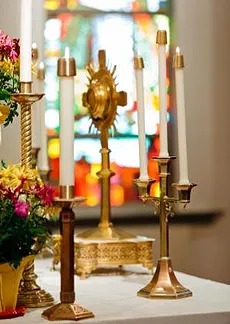 Magdalen College offers an incomparable journey into the Catholic intellectual tradition and four years of immersion in the liturgical and spiritual riches of the Church, recognizing that both flow from a single source. The fruits of these experiences do not remain isolated within the classroom and the chapel but instead flow into the lived experience of the larger community, shaping the patterns, rhythms, and ethos of our daily lives. The college invites her students to embrace and contribute to this culture that supports us in our journey toward wisdom and ever deeper communion.
Magdalen College offers an incomparable journey into the Catholic intellectual tradition and four years of immersion in the liturgical and spiritual riches of the Church, recognizing that both flow from a single source. The fruits of these experiences do not remain isolated within the classroom and the chapel but instead flow into the lived experience of the larger community, shaping the patterns, rhythms, and ethos of our daily lives. The college invites her students to embrace and contribute to this culture that supports us in our journey toward wisdom and ever deeper communion.

Here are a few of the ways to experience Catholic culture at Magdalen College:
Each single-sex residence contains a small chapel where the Blessed Sacrament is reserved during the academic year. Students frequently visit these chapels throughout the day and evening.
Most of our students attend the March for Life in Washington D.C. each year.
We begin and conclude each class and faculty meeting with prayer.
Mass is scheduled so that it does not conflict with classes.
Following the wisdom of Josef Pieper, we feast like Catholics, celebrating feasts and memorials throughout the year with dinners and desserts. (The high points are the Easter Vigil in the spring and the Feast of Saint Nicholas–following our “Lessons and Carols”–in the fall.)
We begin the planning for our post-graduate lives by learning to think of our careers in terms of vocation, asking “What is God calling me to do with my life?”
Our offices are closed on major feasts and solemnities.
Students from the college recently volunteered to assist a young mother who was having a difficult pregnancy. They traveled to her home to help care for the children and assist with other domestic duties.

“I came to Magdalen College because I wanted to both learn and live my faith more fully, and I have not been disappointed. At Magdalen College, my intellectual formation has been infused with the vigorous truth of Catholicism: the light of faith has been a guiding principle not only in my theology courses, but also through a range of subjects including philosophy, music, and physics.
Liturgy beats the rhythm of life on campus, and the graces of mass and adoration have been essential to my growth as a person. The reverence and beauty of liturgy is matched by the joy of a collegiate community centered on Christ, and I am grateful to have formed friends with whom I share a common foundation and goal. Education is about more than the classroom: I have been able to grow in truth throughout my college years because a genuine love of God is the guiding principle of life, in and out of the classroom, at Magdalen College.”

“My Catholic education at Magdalen College has been, and continues to be, a priceless experience that I will cherish forever. I grew up going to public schools, where there is a legally enforced separation of faith from all subject matter. After one week of being at college, I realized that the past 12 years of my education had been lackluster and empty. Christ is the source of all truth and without Him a course of study is weak and meaningless. My education at Magdalen College has opened my mind to a whole new world, in which everything has meaning and everything has consequences.
But most importantly, it has shown me, in more ways than I could have imagined, that Christ is the font of all Truth, and that everything we do and study should pursue heavenly wisdom, aimed towards a deeper union with Him. The reverent adherence to the order of the Mass and the vibrant participation of the community in response and song has helped me to better understand the grandness of the liturgy and the importance and holiness of the priesthood.”

“Magdalen College is a place where truth is constantly sought. The spiritual resources available to students—daily Mass, Rosary, Adoration, Confession—should not be underestimated: there are few things more spiritually restorative than an evening before the Blessed Sacrament, and nothing more strengthening to faith than convenient access to daily Mass.
The ideal that is tangibly being pursued is an environment of faithful peer-to-peer encouragement in virtue: I feel that I can encourage my friends to join me at Mass without sounding “preachy,” and they can do the same to me. We build each other up. The theology courses at the school are constantly engaging you and challenging you to take ownership of your faith and grow in spiritual maturity.
The Catholic atmosphere of Magdalen College is easy to take for granted, but when it is put into perspective, it is so uniquely precious in its inclination to virtue and its determination to form strong, faithful individuals.”

“I believe that Magdalen College does an incredible job of forming students in a Christo-centric, truth-oriented life. Not only is the education itself geared towards learning the truth and discovering how God wants us to live through education, but campus life here also revolves around communion with God.
Mass, conducted reverently and beautifully, is the focal point around which every school day revolves, and no classes and activities are scheduled at Mass times so that students can attend. One sees students leading the daily rosary and Divine Office, or breaking from their afternoon activities to say the evening Angelus together.”

“At Magdalen College I am surrounded by peers who try to encourage and help each other grow in our faith by listening to each other and praying for one another. We have many opportunities to pray community prayers together such as the rosary, the chaplet of divine mercy, and sung Compline. We also offer many different prayer and spiritual reading groups that have helped me answer important theological questions.
Most importantly, the way the liturgy is celebrated at Magdalen College has truly helped me deepen my relationship with God. The reverence of the priests and altar servers along with the beautiful chant and polyphonic music make it so easy to lift one’s heart to God.”
Students will have the opportunity to take one of the following courses for college credit. Taught in Socratic-style seminar discussions, each course enables students to explore a particular interest and consider whether they might like to pursue that academic discipline as a potential college major. Students will spend 3.5-4 hours in class each day, have some assigned homework, and spend the remaining time in prayer, liturgy, sacred music, relaxation with new friends, and a wide range of extra-curricular activities.
Theology of the Body: The Deeper Meaning of Love, Sex, and Marriage (1 credit) – Dr. Ryan Messmore
THIS COURSE IS NOW FULL
When it comes to romantic relationships and marriage, today’s culture is awash in confusion. The Church calls people to see a deeper meaning to sexual desire and marriage. But what is that, and how can it be pursued in modern times? Saint Pope John Paul II has provided valuable teaching in this area. Along with his “Theology of the Body,” this course will explore the nature of love, the meaning of betrothal and marriage, and sexual ethics from a Christian perspective. Class discussions will be theological and philosophical as well as practical.
Philosophy & Humanities: Friendship in Western Culture (1 credit) – Dr. Brian FitzGerald and Dr. Erik Van Versendaal
THIS COURSE IS NOW FULL
One of the most important features of human experience is friendship. Drawing on the great books of Western culture in literature, history, philosophy, and theology, from Aristotle and St. Augustine to Jane Austen and C.S. Lewis, this course will reflect on the nature of friendship across the centuries. Why do we need friends? What makes a good one? What are some obstacles to friendship? What happens as friends grow and mature in different ways?
Christ in Scripture (1 credit) – Deacon Karl Cooper
THIS COURSE IS NOW FULL
“Did not our hearts burn within us while he talked with us on the road, while he opened to us the Scriptures?” In this course we will seek to meet and understand Christ as he presents himself in all the Scriptures. We will read, discuss, enjoy, and pray through the most crucial texts, and focus our work on the living and present Christ.
$395.00 USD
Tuition includes room and board. The purchase of a book may be required for some classes. Students should bring spending money for off-campus trips.
Students will have the opportunity to take one of the following courses for college credit. Taught in Socratic-style seminar discussions, each course enables students to explore a particular interest and consider whether they might like to pursue that academic discipline as a potential college major. Students will spend 3.5-4 hours in class each day, have some assigned homework, and spend the remaining time in prayer, liturgy, sacred music, relaxation with new friends, and a wide range of extra-curricular activities.
Physics: Understanding Boomerangs, Billiard Balls, and Balance Beam Routines (1 credit) – Mr. John Klucinec
THIS COURSE IS NOW FULL
This course explores the laws of motion as described by Galileo and Newton by reading and discussing these authors and through classroom experiments. Students will gain an understanding of physics in concrete phenomena through studying air flight, fluid dynamics, the aerodynamics of the boomerang, the motion of billiard balls, and the physics of gymnastics and diving.
Poetry and Politics in the Western Tradition (1 credit) – Dr. Mary Mumbach
THIS COURSE IS NOW FULL
This course will examine poetic form and political form in the tradition of the West. Students will explore, in particular, how the Incarnation shapes the roles of imagination, prudence, and the heroic in literature and political philosophy. Readings in poetry, fiction, and American Founding documents will be considered.
Moral Philosophy: How Do We Make the Right Decisions? (1 credit) – Rev. Fr. Stephen Rocker
THIS COURSE IS NOW FULL
Natural law morality and utilitarianism are incompatible frameworks of moral reasoning, yet elements of both are mixed in the public mind. Catholic moral teaching and the Western system of law are grounded in natural law. This course will present these two moral frameworks and apply them to moral issues.
$395.00 USD
Tuition includes room and board. The purchase of a book may be required for some classes. Students should bring spending money for off-campus trips.
